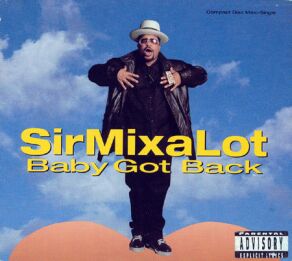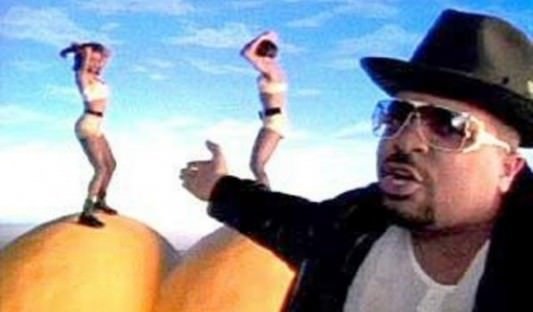Baby Got Back and Hip Hop Resistance to Mass Media Representations of Beauty
>> Monday, October 15, 2012
 |
| Sir MixaLot's "Baby Got Back" |
So begins the infamous introduction to Sir Mixx-a-lot's classic, Baby got Back. The 1992 Billboard topping song was a controversial ode to the Black Women's other Assets. Earlier this year, my Tanzanian friends were playing Drake's The Motto, unaware of the origins of Lil Wayne's final bar.
Twenty years later, the Baby Got Back has been parodied by In Living Color and even Burger King in a Sponge Bob Square Pants remix. Still, the original song captures the contradictory roles of Hip Hop as it both celebrates Black Life and redefines Value in a society that seeks to denigrate Black Culture, while also seemingly objectifying Black Women's bodies.
Although the song was comical and alleged to be sexist, Baby Got Back was a bold, Black lyrical and visual declaration of celebration of Black Women, from a Man's perspective, challenging European notions of beauty in mass media. Through its lyrics and visual representations, it presented and praised an alternate aesthetic to dominate discourse that exalts the pure white woman and belittles the lewd, animalistic Black female.
The song begins with two young, presumably 'typical' white valley girls staring at a Black woman rotating on a raised platform in a tight, yellow dress that accentuates her figure. The voluptuous woman's posterior makes her the object of rappers' attention, according to Becky's friend, and "they only talk to her because she looks like a total prostitute." The bodies of Black women in American have long been sexualized in America. Caricatures of the Black woman as a Jezebel stereotypically present Black women as promiscuous. Lacking further words to describe this "total prostitute," the antagonist concludes "She's just so ... Black," thus completing the conflation of Black Womanhood with Prostitution.
The song kicks off with Mixx's fast-tempo flow. The song is an honest celebration of Black Feminine Form, commencing with the words, "I like Butts and I Cannot Lie." The song alludes to provocative Hip Hop pioneers, 2 Live Crew and their famous Full Metal Jacket sample, and even references Bill Withers, as Mixx is willing to let the subject of his attraction–not the object of his affection–to "use me, use me," as she's not the "average groupie." Maybe the Withers' example is a stretch, but Hip Hop has long provided another medium and platforms, as corporate media rarely allowed different perspectives than the dominant paradigm.
Mixx-a-Lot turns his attention to mass media saying, "I'm tired of magazines, saying flat butts are the thing." He sees his perspective as that of the majority of Black men. He suggests, "ask the Average Black Man," and he'll tell you that the woman they'd prefer, "gotta pack much Back." Encouraging Black Women to be proud of their physical form. "So Cosmo says 'You're fat,' well I ain't down with that." He adds "shake that healthy" butt, combating the notion that super thin models are the epitome of health, calling Playboyesque models with "silicone parts ... made for toys" "bimbos." Instead, Mixx desires to "keep my women like 'Flo-Jo'," acknowledging the gorgeous former Olympian, opposed to Jane Fonda's workout tapes.
Finally, the lyric, "Give me a sista i can't resist her," inspired the Khalid Muhammad's introduction on Ice Cube's song, "Cave B*tch," another song critiquing this white hegemonic aesthetic. The lyrics paint a picture that "Black is Beautiful," and the video–somewhat–continues this vision.
 |
| Sir MixaLot in Big Booty Heaven, during "Baby Got Back" video. |
The video evokes other Black Power tropes, as Mixx-a-lot wears a DMC-like Black leather jacket and hat. He gives himself a "Soul Brother" fist-heart-pump when speaking to that average black man, whose aesthetic preferences are commonly ignored, who appears on "WBUN" news to express solidarity with 'Back.'
The song contrasts the popular images with satire of "rock videos with knock-kneed bimbos walking like h*es." A woman wearing a madonna-styled coned bra is brought down from the pedestal of high culture, to be replaced by a Black Woman with a complete figure. And a woman with long hair and more Melanin than anyone who'd appeared on Cosmo's front cover evokes the imagery of The Birth of Venus.
Meanwhile, subliminal reverse text images flash on screen throughout the video, including "RUMP" "THICK" "REAR"--even the scientific term, "DORSIUM."
The lyrics and visual imagery combine to deliver a one-two combo to white, patriarchal depictions of Black beauty. Still, the video and song are not without contradictions.
The lyrics on the bridge, "LA Face with the Oakland booty" was to the disappointment of many Bay Area women who appreciated the acknowledgement of their diverse body shapes, but not the devaluement of their faces–especially compared to LA. And the focus on just the butt could be overlooked if their were other songs like, "Baby got Brains," for example.
With MixaLot standing a top of larger-than-life butt, some imagery in the video could interpreted in many ways. Such as the various fruits as representations of other human body parts. Also, the invitation to roll in his Mercedes was part of the growing materialism that emerged during the late 1980s in Hip Hop.
The idea that in response to seeing the superior physique of the Black Women, that "even white boys got to shout," was a funny line, but it can be seen as another example of needing validation of white men.
During a time of heavy conflict over media censorship, "Baby Got Back" was a bold statement praising Black Women and combating mainstream European standards of beauty. I imagine it falls short of many feminists' standards of acknowledging the innate beauty of women, but his effort to present another narrative and acknowledge different concepts raises this song to the level of an anthem.
And his word to the 'thick soul sistas', i won't cuss or hit you," also drastically differs from music today that reinforces America's normalization of verbal and physical abuse of women. And the centering of Black Women in a video is a stark different of rapper's of today who no longer objectify Black Women, but instead idolize "others." Thus, Hip Hop must been seen as a tool of resistance that has been co-opted and now serves elite, corporate, white supremacy-infused capitalism.
Sir Mixx-a-Lot - "Baby Got Back" (1992)



0 comments:
Post a Comment